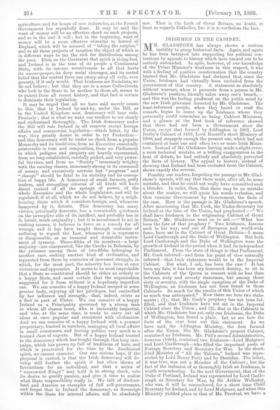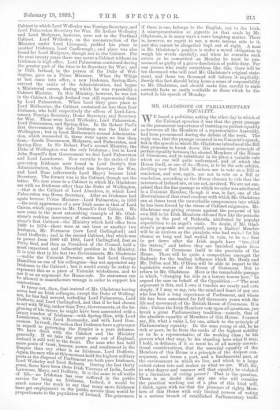IRISHMEN IN THE CABINET.
TR. GLADSTONE has always shown a curious —ILL inability to grasp historical facts. Again and again he has been betrayed into supporting his political con- tentions by appeals to history which have turned out to be entirely unfounded. In spite, however, of our knowledge of the Prime Minister's weakness in this respect, it was with a feeling of positive consternation that the country learned that Mr. Gladstone had declared that, since the Union, Irishmen had virtually been excluded from the government of this country. A statement so absolutely without warrant, when it proceeds from a person in Mr. Gladstone's position, literally takes away one's breath,— and this was the feeling produced on the public mind by the new Irish grievance invented by Mr. Gladstone. The least-informed people, when they heard or read the remark, began to count up the Irishmen whom they personally could remember as being Cabinet Ministers, and a glance at the first book of reference showed that there had not been a Government since the Union, except that formed by Addington in 1801, Lord Derby's Cabinet of 1858, Lord Russell's short Ministry of 1866, and strangely enough the present one, which had not contained at least one and often two or more Irish Minis- ters. Instead of Mr. Gladstone having made a slight error, a mere technical mistake, or a trifling exaggeration in the heat of debate, he had entirely and absolutely perverted the facts of history. The appeal to history, instead of showing that Ireland had been excluded from the Cabinet, shows exactly the. reverse.
Possibly our readers, forgetting the passage in Mr. Glad- stone's speech, will say that there must, after all, be some mistake, and that he could not really have committed such a blunder. In order, then, that there may be no mistake about the matter, we will quote his words verbatim, and then examine Government by Government, the facts of the case. Here is the passage in Mr. Gladstone's speech. After mentioning that Mr. Cook, the Under-Secretary for Ireland. at the time of the Union, had prophesied :—" We shall have Irishmen in the originating Cabinet of Great Britain," Mr. Gladstone went on to ask :—" What has been the fate of that prophecy ? Two Irishmen, famous each in his way, and one of European and world-wide fame, have sat in the Cabinet of Great Britain—I mean Lord Castlereagh and the Duke of Wellington. But both Lord Castlereagh and the Duke of Wellington were the growth of Ireland in the period when it had its independent Parliament. Prom the state of things in that Parliament, Mr. Cook inferred—and from his point of view naturally inferred—that Irish statesmen would be in the Imperial Cabinet. But what, I ask, has been the case ? It has been my fate, it has been my honoured destiny, to sit in the Cabinets of the Queen in concert with no less than between sixty and seventy statesmen, but among those sixty or seventy, with the single exception of the Duke of Wellington' an Irishman has not been found in those Cabinets. So much for the results of this Union of which so much was anticipated." Now there are here two state- ments; (1), that Mr. Cook's prophecy has not been ful- filled, and that Irishmen have not sat in the Imperial Cabinet since the Union ; and (2), that in the Cabinets in which Mr. Gladstone has sat, only one Irishman, the Duke of Wellington, has found a place. Let us see how the facts of the case bear out this statement. As we have said, the Addington Ministry, the first formed after the Union, like Mr. Gladstone's present Cabinet, contained no Irishman. Mr. Pitt's second .Administration, however (1804), contained two Irishmen—Lord Mulgrave and Lord Castlereagh—who filled the important posts of Foreign Secretary and Secretary for War. In the short- lived Ministry of "All the Talents," Ireland was repre- sented by Lord Henry Petty and by Sheridan. The latter, it was true, was not a Member of the Cabinet; but the fact of the inclusion of so thoroughly Irish an Irishman, is worth remembering. In the next Government, that of the Duke of Portland, Ireland. was represented by Lord Castle- reagh as Secretary for War, by Sir Arthur Wellesley, who was, it will be remembered, for a short time Chief Secretary for Ireland, and by Lori Mulgrave, and when this Ministry yielded place to that of Mr. Percival, we have a Cabinet in which Lord Wellesley was Foreign Secretary, and Lord Palmerston Secretary for War. Sir Arthur Wellesley and. Lord. Mulgrave, however, were not in the Portland Cabinet. Lord Wellesley, on the reconstruction of the Ministry under Lord Liverpool, yielded his place to another Irishman, Lord Castlereagh ; and place was also found for Lord. Mulgrave, though not in the Cabinet For the next twenty years there was never a Cabinet without an Irishman in high office. Lord Palmerston continued during the greater part of the time to be Secretary for War ; and in 1828, Ireland, in the person of the Duke of Wel- lington, gave us a Prime Minister. When the Whigs at last came into office, a new Irishman, Spring-Rice, entered the ranks of the Administration, and began a Ministerial career, during which he was repeatedly a Cabinet llitinister. In this Ministry, however, he was not in the Cabinet, though Ireland was still represented. there by Lord. Palmerston. When Lord. Grey gave plade to Lord Melbourne, the Cabinet contained no less than four Irishmen, who held respectively the offices of Lord-Lieu- tenant, Foreign Secretary, Home Secretary, and Secretary for War. These were Lord Wellesley, Lord Palmerston, Lord Duncannon, and Spring-Rice. In Sir Robert Peel's first Government the only Irishman was the Duke of Wellington ; but in Lord Melbourne's second Administra- tion, which succeeded it, there were again no less than four,—Lords Duncannon, Mulgrave, and Palmerston, and Spring-Rice. In Sir Robert Peel's second Ministry, the Duke of Wellington was the only Irishman ; but in Lord John Russell's first Government we find Lord Palmerston . and Lord. Lansdowne. New recruits to the ranks of the governing Irishmen were found. in Lord Derby's first Administration, when Beresford was Secretary for War, and. Lord. Naas (afterwards Lord Mayo) became Irish Secretary. The former was in the Cabinet, though not the latter. We now come to a Cabinet in which Mr. Gladstone sat with an Irishman other than the Duke of Wellington, —that is the Cabinet of Lord Aberdeen, in which Lord Palmerston was Home Secretary. After an Irishman had again become Prime Minister—Lord Palmerston, in 1859 —the next appearance of a new Irish name is that of Lord Cairns, which appears in Mr. Disraeli's first Cabinet. We now come to the most astonishing example of Mr. Glad- stone's reckless inaccuracy of statement. In Mr. Glad- stone's first Cabinet—the Ministry which held office from 1869 to 1874—there were at one time or another two Irishmen, Mr. Fortescue (now Lord Carlingford) and Lord Dufferin ; and in the second Cabinet, that which was in power from 1880 till 1885, Lord Carlingford, first as Privy Seal, and then as President of the Council, held a most important and. influential position in the Ministry. It is true that in his last two Governments, Mr. Gladstone —unlike the Unionist Premier, who had Lord George Hamilton as one of his colleagues—has not appointed any Irishmen to the Cabinet ; but it would surely be unfair to represent this as a, piece of Unionist wickedness, and to use it as an argument for Home-rule. No statesman can be allowed to manufacture wrongs in order to support his Contentions. It turns out, then, that instead of Mr. Gladstone having never had an Irish colleague, except the Duke of Welling- ton, he has had several, including Lord Palmerston, Lord D utterin, and Lord Carlingford, and. that if he had chosen to act with Whig, rather than Tory, Governments, at the be of his career, he might have been associated with a larger number of Irishmen—with Spring-Rice, with Lord Lettaxodn. I owne, with Lord Normanby,. and with Lord Dun- n truth, the notion that Irishmen have a grievance in regard to govewrnn. g the Empire is a pure delusion. We have dealt with the Cabinet and the Ministry generally. If we take the great posts out of England, Ireland is still well to the front. The man who has held more posts of trust, honour, power, and. emolument in the Empire than any other is an Irishman Lord. Dufferni. Again, themen who at this moment hold the ighest military posts at the disposal of Parliament are both puhrelIrishmen, Lord Wolseley and Lord Roberts. t years, there have been three Irish V. During the last y Lawrence, Mayo, and Dufferin. It Viceroys of India, Lords has ever is thesame in an walks of life,—no Irishman suffered in. the public service for being an Irishman. Indeed, would. be much nearer the mark to say that many more Irishmen have got employment in the public service than would be proportionate to the population of Ireland. The grievance, if there is one, belongs to the English, not to the Irish. A misrepresentation so gigantic as that made by Mr. Gladstone, is in many ways a mere laughing matter. There is, however, we regret to say, a more serious side to it, and this cannot be altogether kept out of sight. A man in Mr. Gladstone's position is under a moral obligation to weigh his words carefully, and when he commits such errors as he committed on Monday he must be pro- nounced as guilty of a grave dereliction of public duty. For one person who reads corrections like this, there will be ten thousand who will read Mr. Gladstone's original state- ment, and these ten thousand will believe it implicitly. Surely this fact should bring home a sense of responsibility to Mr. Gladstone, and should make him careful to state correctly facts so easily verifiable as those which he dis- torted in his speech of Monday.



































 Previous page
Previous page